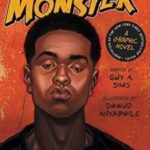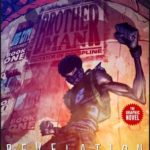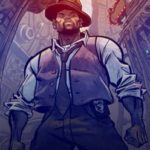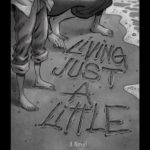by Karsonya “Kaye” Wise Whitehead, Ph.D.
One of my favorite childhood activities was reading the Sunday comics. I spent hours reading and rereading the strips, imagining that the characters were real, and wondering how their stories would end. This love of comic strips naturally developed into a love for comic books by the time I reached high school. Between studying for chemistry and writing history papers, I indulged in reading about Superman (though I challenged this idea of an alien being the most humane person on earth) and Batman (though I could not get over the fact that he was actually just a rich man with a bunch of cool toys). I often grew frustrated as I searched and hoped for a comic book character who looked like me. My hope finally became a reality when I received a copy of Brotherman, the story of a black superhero written and drawn by Guy A. Sims and his brother, Dawud Anyabwile. I have followed their work since and was delighted to see this creative team delve into the world of graphic novels as they adapted Walter Dean Meyers’ National Book Award-nominated young adult novel Monster.
When I read comics, I think of many questions I wish I could ask the artists – how do they decide what to illustrate, how do they develop the characters? In this month’s interview, I got the opportunity to learn the answers to some of my questions. I sat down with Dr. Guy A. Sims, my former college advisor, and discussed his work as a writer, a comics artist, and a graphic novelist.
*An extended version of this interview and discussion may be found on my personal blog.
Kaye Whitehead: Why did you decide to be involved in adapting Monster into a graphic novel?
Guys Sims: When the project was brought to my attention, I wasn’t sure of how to approach it. I knew there were some fundamental differences between writing a comic book and a graphic novel, so it required a little story structural research on my part. I read a couple of popular graphic novels and thought about how I would present the material. Secondly, I was not familiar with the book Monster. I read the book about four or five times, seeking to understand the story, the characters, but most importantly, what Walter Dean Myers was trying to convey. [Once I became more comfortable with the task], I was excited to get started, even though I was still very nervous. After submitting my first couple of pages to Mr. Myers and the representatives at HarperCollins and receiving very positive responses, I knew I had what it took to do this.
KW: Which writers inspire you?
GS: My all-time favorite writer, the one who inspired me to want to attempt to be a writer, is Richard Wright. My father introduced him to me when I was in sixth grade. I started with Black Boy, moved to The Long Dream, and then Native Son. After that, I was introduced to many African American authors whose styles and themes continued to intrigue me. People like Baldwin, Hansberry, Cullen, McKay, and others. Like many young writers, I tried to emulate their styles until I felt comfortable with my way of storytelling. Today, I am still influenced by writers. Contemporary writers who I look to for inspiration are people like Bebe Moore Campbell, E. Lynn Harris, and Octavia Butler.
KW: What does being a writer mean to you?
GS: Being a writer means the ability to shape culture. This is not an egoistic statement but to be able to take a statement, position, theme, or concept and deliver it in a format that’s intellectually digestible is pretty powerful. In fact, my father told me always to believe in what I wrote because people who read your writing will believe you. Being a writer is also liberating. It is an outlet for feelings. Whether I’m down or happy, confused, or angry, whatever, I can find a way to express it…and in that process, analyze what is going on inside. Then, if I share it with someone, they may find the same internal resolution needed.
KW: You refer to yourself as a scholar/writer – what does that mean to you?
GS: Being a scholar writer means my writing, the poems, prose, fiction, etc., is informed by my academic research. My writing focuses on intimate relations between groups of people. I read a lot of non-fiction and academic books on social interaction, conflict theory, and history, and group dynamics. They form the foundation for how I approach stories.
KW: Why did you decide to write comic books? And what can we expect next?
GS: The comic books began as a marketing tool for my brother’s airbrush business and then it turned into the opportunity to step into the comic book world. While I had never written a comic book before that time, I knew it was something I could learn to do…and I did.
I have a number of projects on the horizon. I have the fifth installment of the Duke Denim detective series to complete this summer, my brother and I are working on the second edition of the Brotherman Graphic Novel, Revelation, and I am laying out the foundation for my next novel, which looks at the Virginia Tech shootings. There are also a couple of others that are in the works…I stay busy.
KW: Fifty years from now, how would you like your work to be taught or discussed?
GS: I understand that my works, in the future, will not belong to me. My intentions and perspectives will fall away to be interpreted by the new readers…and that’s okay. I did that to William Shakespeare. I read his works and applied them to my life and understandings. That will happen to those who read my works. In fact, it happens now. I have had people write to me or contact me and tell me what they thought my writings were about and what meanings they held. Of course, it may not have been my intentions, but I’m happy to know they connected with it in their own way. That’s what writing and art are all about.
KW: What writing advice do you have for other aspiring authors?
GS: I have several pieces of advice. 1. Be your first cheerleader. That is, celebrate when you complete a project, write a passage, develop a concept. 2. A bad idea is an idea whose time may not be right or needs a tweak or just needs a whole makeover. Save them; it may not be right for you at the moment, but you never know…one day. 3. When it is ready for the world, give it to the world. Sometimes writers ask for lots of opinions and that’s what you’ll get…diverse opinions. When that happens, many writers never finish. Complete your work and then let it go. Someone’s gonna love it, and someone’s gonna hate it. 4. Read writers outside of your genre, listen to music you are not familiar with, go to art shows you don’t understand, and go to places unfamiliar. All of this and more will feed your creativity. 5. Most of all, write whenever you can. Think of all the time spent in front of the TV that could have been used for your creativity. 6. Last, carry a small notepad and pencil with you for when you’re hit with an inspirational thunderbolt.
KW: Is there anything else you would like to add?
GS: I want to encourage people to know that we all have a story to tell. I often hear people say they can’t make up stories (or poems or whatever). Truth is, we tell stories every day when relating our experiences. We tell stories when our significant others or children make us mad, when we find money in the street, when we fall in or out of love. Stories are in us…just don’t be afraid to set them free.
About the Writer: Guy A. Sims, Ed.D., is the Assistant to the President for Equity, Diversity, and Inclusion and the Title IX Coordinator at Bluefield State College. He is the principal writer for the Brotherman series and the author of The Cold Hard Cases of Duke Denim and the critically acclaimed novel, Living Just A Little. Guy has recently written the adaptation for MONSTER: The Graphic Novel by Walter Dean Myers, published by HarperCollins Publishers. Guy also writes a blog, I is the Future.
About the Interviewer: Karsonya “Kaye” Wise Whitehead, Ph.D. is Associate Professor, Department of Communication at Loyola University Maryland and the Founding Executive Director at The Emilie Frances Davis Center for Education, Research, and Culture. Her new anthology, RaceBrave, was published in March 2016.





